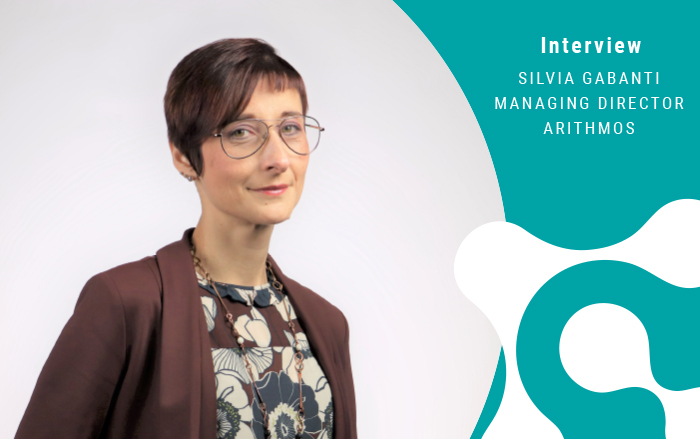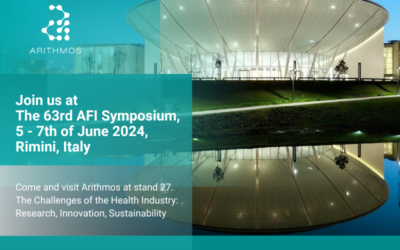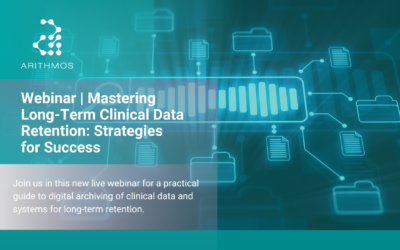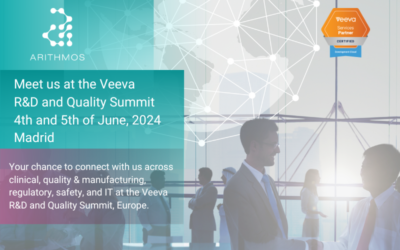As the word “digital transformation” appears more and more often on the Life Sciences event agenda and in industry article titles, Arithmos has decided to look at this trend through the eyes of an industry professional. We sat down with Silvia Gabanti, Managing Director of Arithmos, to talk about how technology transforms clinical research, patient centricity and healthcare and what are the biggest challenges for going digital.
Silvia Gabanti has an impressive 15-year track record in the Life Sciences industry which started in the CRO environment where she was working with applications for pharmacovigilance and clinical trials.
Hello Silvia, thank you for joining us today. Digital transformation is a big concept what can be defined in numerous ways, how would you personally describe it?
I would say that Digital Transformation is a transformation of all the activities, processes and competencies in a way that allows us to harness the advantages of new digital technologies.
In order to approach digital transformation, all companies should think and act as technology companies, regardless of the industry they belong to.
I know it is not easy – it is a complete change of mindset! That is why such companies as Arithmos exist – we can act as consultants to bring this cultural shift in a company.
When did the relationship between digital transformation and Life Sciences start?
I am convinced that the industry started to change already two decades ago. It was not a drastic change though, but rather a slow one. It all started when technology became available not only for tech people but also for regular users. The Digital Transformation was on track when personal computers appeared in every home.
This was when the Life Sciences industry took notice and jumped on the new trend and started looking closely at technology.
The next Digital Transformation benchmark was at the end of the 2000s when social networks evolved. What started as entertainment actually had a significant impact on the Life Sciences industry. Just look at how companies are using social media for signal detection in pharmacovigilance or for recruiting patients to trials!
Life Sciences, like any other industry, mirrors our lives – technology is changing our lives, and we bring these changes to more complex fields like clinical research.
Technology became an extension of our resources and capabilities.
It definitely did. What is the manifestation of these changes that technology brings in Life Sciences?
I would say the key manifestation is information. Take the same social media we have been talking about – it is not a complex technology. What is exceptional about it is the huge flow of information that we have never seen before.
The amount of information we deal with now in the pharmaceutical environment is staggering. However, this information is what feeds the industry – information is the basis of the clinical research and Pharmacovigilance, and all this data and information allows us to make better decisions that result in better outcomes for patients.
Another manifestation of digital transformation is advanced technology. We are now developing tools that help us deal with this huge flow of information: – IoT, Artificial Intelligence, etc. The next step is Machine Learning, an extension of Artificial Intelligence.
Digital Transformation can brighten the future of Life Sciences, but for sure, there are constraints when it comes to these new technologies. What are the two biggest challenges in your opinion?
I would say that the biggest constraints are data security, privacy, and data integrity. It is of paramount importance to safeguard the privacy of data and to ensure that the data is reliable and accurate. And let’s not forget about compliance! Otherwise, there can be negative consequences for all the stakeholders involved: from the physician to the drug development companies, and most importantly the patient.
Over 50 percent of pharma companies reported data security breaches last year. If we are going to treat data as our most valuable asset, as it should be, we also need to protect it.
How can we ensure security and privacy?
Every entity that processes personal and/or sensitive data should think of security and privacy in a broader sense since privacy is not limited to only their system. They should see the whole picture. Even if the patient data in the Clinical and/or Safety system is pseudo-anonymized, the risk of multiple breaches in different systems (even if indirect and remote) has to be taken into account and mitigated. Here is where we see continuously evolving technology adding to the complexity of security and privacy risk management. By evolving technology, I mean IoT, usage of personal devices in Clinical Trials, and so on.
Again, this requires a change in mindset and understanding the importance of investing in this area. Digital Transformation is not simply the implementation of new technology, it’s a structural change.
What about GDPR?
GDPR is something quite new in terms of regulations, but it has followed the privacy trend that has always existed in Life Sciences. Nevertheless, the new regulation lays the foundation for a more structured and coherent approach to data privacy and security.
What about data integrity?
Data integrity means the data must be reliable. Sounds simple, but in reality, it is a complex task. Here technology is essential: vendors should have technology solutions that allow for complete, consistent and accurate data outputs.
This means that companies must implement meaningful and effective strategies to manage their data integrity risks based on their process understanding and knowledge management of technologies and business models. What does Arithmos do to stay on the forefront of Digital Transformation in Life Sciences?
We leverage. For Arithmos, Digital Transformation is not a result, it is a process. We accompany our clients on this path: we help them to identify the need and then work together on transforming the processes and finding the right technology to satisfy this need.
Of course, we should not forget about change management. Digital Transformation is not possible without changing mentality and the business culture in general, and Arithmos can support with this. Our digital transformation starts internally, and we perform training and explain new approaches to all employees from upper management to operational, business and administrative resources. We also define a sustainable roadmap.
We believe in Digital Transformation and the innovative changes it brings to Life Sciences environment.
Digital Transformation with Arithmos
Do you want to integrate new technologies and processes? Is your company evaluating a digital health strategy? Arithmos works with companies to define a Digital Transformation journey that includes:
- Disruptive Technologies – Digital Health and eClinical selection and consultancy: IoT/Wearables, eClinical (EDC, ePRO);
- Process Management – Review and improvement of procedures and SOPs;
- Oversight & Visual Analytics – Oversight platform, Business Intelligence tools, Visual Analytics, Statistical/Data Interpretation and Data Management;
- Data Integrity & Security – Gap analysis for data security and GDPR compliance, Computer System Validation in GxP environment, necessary ISO certifications;
- Industry Compliance – Regulatory guidance and compliance;
- Data Science – Biostatistics, Statistical Programing, and Data Management;
Send us an RFI via our website to understand how Digital Transformation can be applied to your company!




